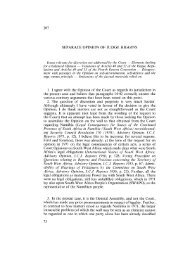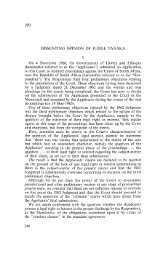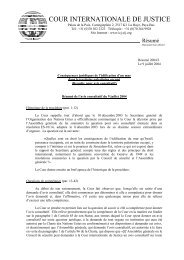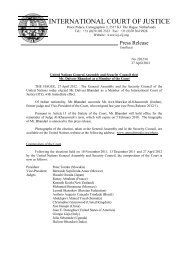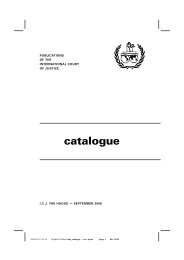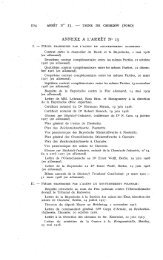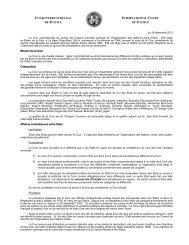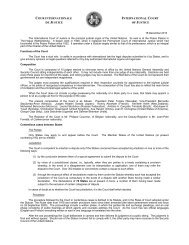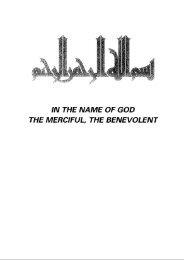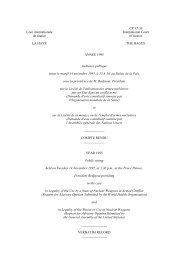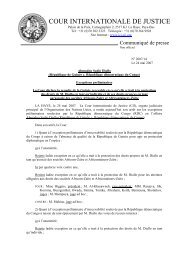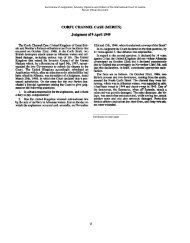botswana/namibia - Cour international de Justice
botswana/namibia - Cour international de Justice
botswana/namibia - Cour international de Justice
You also want an ePaper? Increase the reach of your titles
YUMPU automatically turns print PDFs into web optimized ePapers that Google loves.
Agreement, and thereafter the assertion of acquiescence, or failure to protest becomes even<br />
less convincing. The only 'evi<strong>de</strong>nce' offered by Namibia is the existence of South African<br />
military patrolling in the region: see above, paras 694-6.<br />
791. In the aftermath of the inci<strong>de</strong>nt of October 1984, the Botswana Government affirmed<br />
title over Kasikili/Sedudu Island and its view of the legal position was confirmed by the Joint<br />
Survey Report of 1985. Thus, from 1951 onward there was no possibility of any ignorance by<br />
South Africa of the entitlement of Botswana and its pre<strong>de</strong>cessor in title.<br />
792. In the period from 1960 (if not earlier) until 1992, when the island was administered as<br />
part of the Chobe Game Reserve and cultivation on the island was prohibited, no protest or<br />
representation was received either from the South African Government or from local<br />
administrators in the Eastern Caprivi. This silence is difficult to explain except on the basis<br />
that there had at no point been an occupation of the island by the South African Government<br />
or persons acting with its authority.<br />
793. There is a final consi<strong>de</strong>ration. The prescription scenario invented by Namibia involves a<br />
setting asi<strong>de</strong> of the Anglo-German Agreement. The argument is stated to provi<strong>de</strong> an 'entirely<br />
in<strong>de</strong>pen<strong>de</strong>nt basis for Namibia's claim': Namibian Memorial, p.60, para. 165. The difficulty is<br />
that in relation to an argument based upon prescription and an alleged possession à titre <strong>de</strong><br />
souverain, it is impossible to pursue the legal argument in the absence of reference to the<br />
Anglo-German Agreement. In or<strong>de</strong>r to <strong>de</strong>monstrate the existence of possession in good faith,<br />
and accompanied by a belief in sovereignty, the law requires either adherence to the boundary<br />
established by agreement, or an express waiver of title in face of a claim. In other words, the<br />
process of prescription can only apply to a treaty-based boundary if the mo<strong>de</strong> of application<br />
reflects important consi<strong>de</strong>rations of public or<strong>de</strong>r, namely, the stability of boundaries and the<br />
principle of pacta sunt servanda. In the absence of an express waiver of title, the possession (if<br />
it existed) could not be à titre <strong>de</strong> souverain. No German or South African or Namibian official<br />
could claim ignorance of the Anglo-German Agreement and its relevance to the <strong>de</strong>termination<br />
of sovereignty over the island. No express waiver of title took place on the part of Botswana<br />
or its pre<strong>de</strong>cessors (and no other form of waiver occurred in any case).<br />
794. Prior to 1948 no dispute had arisen in any event. After that, the South African<br />
Government had notice that the British Government claimed title on the basis of the<br />
Agreement. After the transactions of 1984 and 1985, the title of Botswana in accordance with<br />
the Agreement was confirmed. At no stage, therefore, could any putative possession by South<br />
Africa have been, in the legal sense, peaceful and undisturbed.<br />
__________<br />
CHAPTER 10<br />
The Namibian Submissions and the Task of the <strong>Cour</strong>t<br />
(A) The Special Agreement<br />
795. The task of the <strong>Cour</strong>t in this case is <strong>de</strong>scribed in the clear terms of Article 1:



